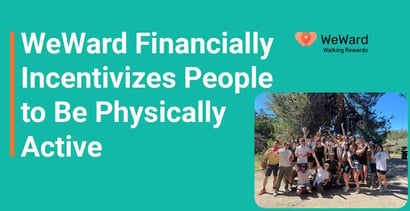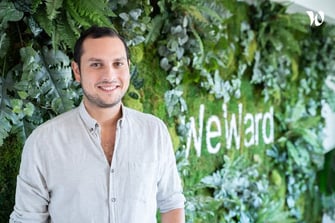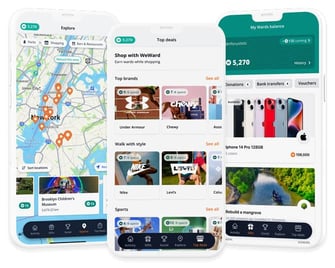
In a Nutshell: Walking is a form of exercise that people often overlook. WeWard incentivizes people to walk by offering rewards that users can exchange for charitable donations, gift cards, and money. The company’s app is available in nine countries around the world. WeWard employs gamification in its app to promote user engagement.
Most of us would like to be in better physical shape. But for people who find their daily schedules packed with other obligations, it can be easy to push exercise to the bottom of our to-do lists. Finding the time to be physically active isn’t a problem for everyone — some may lack confidence in determining what exercise method will be the most effective for them.
The good news for people struggling to start a personal exercise program is that even relatively small increases in physical activity can improve mental and physical well-being.
WeWard is a company that rewards people for walking. We caught up with Yves Benchimol, WeWard’s CEO and Co-Founder, to learn more about how WeWard motivates people to increase their physical activity.

Benchimol said he lived a sedentary lifestyle prior to founding WeWard. He worked as an engineer, and his typical day consisted of sitting and working in front of a computer. When hungry, Benchimol said he’d order food that delivery services would bring to him. If he needed to travel anywhere, he’d use a ride-sharing service before walking, running, or biking to his destination.
Technological advances can improve people’s lives, but they can also make physical movement less necessary. Benchimol said it’s not natural for people to be sedentary as they go about their lives, and walking is one way people can be active while learning to reconnect with their surroundings.
“Technology’s conveniences can help to simplify people’s daily routines, but they can also make people lazy,” Benchimol said. “Walking can solve a lot of issues. It helps to improve our physical and mental health.”
In addition to improving a person’s health, walking can also improve the health of the planet. Benchimol said people who walk to get where they’re going instead of using a gas-powered vehicle are reducing their carbon footprint.
Motivating Walkers Around the World
WeWard motivates its users to walk more by offering them financial incentives. Benchimol said walkers may realize additional economic benefits by not using ride-sharing services or filling their vehicles with gasoline less frequently than non-walkers. Walkers may also avoid the health problems that can beset those who live a sedentary lifestyle.
Benchimol said walking is an activity anyone can enjoy, regardless of where they live or work. He added that people can walk to get from one point to another or take a stroll through their neighborhood and end their walk where it began.
“There are so many places people can take a walk,” Benchimol explained. “We believe we need to change people’s lifestyles to introduce walking into their daily habits. It’s just a matter of motivation. One of the reasons we built this company is to increase people’s commitment to walking.”

Most of WeWard’s users live in large metropolitan areas, such as New York or Chicago, Benchimol said. The majority of WeWard’s users are female, and their average age is between 25 and 35 years old.
Benchimol said WeWard’s app is popular in international markets, including France, where 10% of people have downloaded the app. WeWard offers its app to users in nine countries, including the U.S., numerous European countries, and Japan.
An app that provides financial incentives for an activity as common as walking is prone to attract people seeking to use the app dishonestly, Benchimol said. WeWard uses algorithms to detect and thwart fraudulent activity.
“People can try to find a way to cheat our system, but, in the end, they’re only cheating themselves,” Benchimol said. “Those who are manipulating the app and not using it as intended are going to completely miss out on the benefits of walking. People like to walk. Of course, we believe our success is due to the financial rewards we offer, but walking is something that people can feel the benefits from.”
WeWard Users Can Support Charitable Causes
WeWard users earn digital currency for walking. Users can convert the digital currency they receive from WeWard into cash through PayPay or Venmo or by executing a money transfer directly to their bank account.
WeWard’s relationships with partners allow its users to redeem their rewards for gift cards. Benchimol said users who redeem rewards with WeWard’s partners can earn additional benefits.
“If a user chooses to exchange their rewards for a gift card from one of our partners, then their rewards will be increased,” Benchimol detailed. “For example, a user may have $10 in WeWard rewards. They can turn that amount into $15 worth of gift cards.”

WeWard also allows users to donate their rewards to charitable organizations. Benchimol said WeWard users can direct their donations to support various causes, including planting trees, supporting educational initiatives, and aiding people experiencing homelessness.
“Our charitable component is very powerful, especially in the U.S.,” Benchimol said. “People like to donate their rewards to causes that help others.”
WeWard uses gamification to promote user engagement. The company offers users virtual rewards for reaching walking milestones.
“We provide users with virtual rewards such as badges that show the progress users have made,” Benchimol said. “Our virtual rewards are given within the WeWard app, and they help people celebrate their walking achievements. This is the way the human brain works — it’s always looking for rewards.”
Those needing proof that people value virtual rewards need look no further than social media websites, Benchimol said. The number of followers someone has on social media or the number of likes they receive on a post are forms of virtual rewards.
“Gamification can motivate users who aren’t on social media,” Benchimol said. “But when you add the social aspect on top of the game, retention and motivation will be much stronger.”
Walking Helps Individuals Prevent Diseases
Benchimol said many studies prove the benefits of walking on an individual’s physical and mental health. Walking can help people prevent diseases and become physically fit.
“The thing is, it’s not true that a person has to do 10,000 steps every day to be healthy,” Benchimol said. “Studies show that if you increase your number of steps, then you will decrease the risk of heart disease. So the important thing isn’t to do a certain number of steps but to do more than you did before.”
WeWard promotes the health benefits of walking because it’s an activity most people can participate in. WeWard’s app also rewards people for engaging in other forms of physical activity, including running and cycling.
“Our vision is to motivate as many people as possible to increase their movements,” Benchimol explained. “Activities like running can be very challenging to a beginner, so we primarily focus on walking to be as inclusive of as many people as we can.”
WeWard users can earn up to $100 per year for walking. Benchimol said users can earn extra money by engaging in activities such as completing surveys within WeWard’s app and taking advantage of offers from partners.
“People can underestimate the value of walking, but it’s an activity that can benefit the individual and the planet,” Benchimol said. “Walking can help improve concentration and productivity levels. It’s also a social activity that connects people to each other.”






